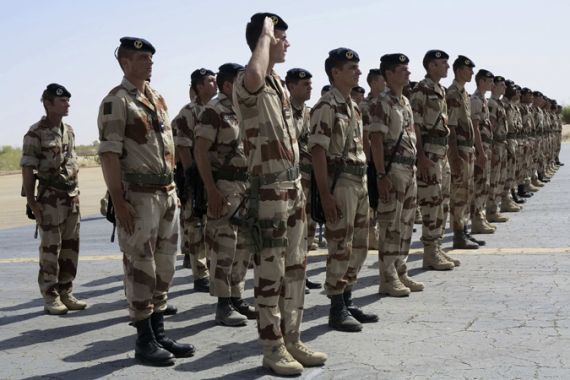France pledges to keep fighting al-Qaeda
Hollande says he is taking AQIM threats seriously and that operations in Mali should continue for “as long as it takes”.

French President Francois Hollande has said that he is taking threats made by al-Qaeda against his country seriously.
He was responding on Tuesday to threats made by al-Qaeda in the Islamic Maghreb (AQIM) in a video message posted on April 25.
“We are taking seriously the threat by AQIM,” Hollande said in Paris, adding that despite considerable losses inflicted on Islamists in Mali, “the terrorist threat has not disappeared”.
“So we believe we must continue the operation in Mali for as long as it takes, even if we reduce our presence, and stay vigilant around Mali to continue the fight against terror.”
So we believe we must continue the operation in Mali for as long as it takes, even if we reduce our presence, and stay vigilant around Mali to continue the fight against terror.
Hollande said he had ordered measures to protect French installations abroad.
Abu Obaida al-Annabi, the leader of AQIM said in the April video messsage posted online that it was the “duty” of “all Muslims … to attack to attack French interests everywhere.”
Annabi, presented as the head of the council of dignitaries of AQIM, called for “full mobilisation” to combat the “new crusade of France”.
“Jihad is now the duty of every capable among you,” he said in the message.
“If the French president wants his crusade to be quick, short and limited, to spare his country descending into a swamp like that faced by Americans in Iraq and Afghanistan, it is your duty to foil his plan and drag him into an open war,” Annabi said.
Annabi said such a war would “drain France’s economy, exhaust its capabilities, and push it into a recession and contraction”.
France also suffered an attack on its embassy in the Libyan capital Tripoli last month, which wounded three people. No group has claimed responsibility for the attack.
Al Jazeera’s Jacky Rowland, reporting from Paris, said that much of the target of the anger has been the French military intervention in Mali.
“Next to Mali is Niger, there are crucial installations of French uranium mines that France needs for its nuclear power stations,” she said.
“It’s worth noting that during the French intervention in Mali, security was increased around the nuclear power plants, with some people saying the French special forces had also being deployed.”
She noted that the president of Niger was also visiting France this week.
France sent troops in January to Mali to crush al-Qaeda-linked groups that had taken control of half of the country.
Withdrawal under way
French troops fighting alongside the Malian army and other African soldiers have largely succeeded in driving the fighters from the north, but pockets of resistance remain, particularly in the Gao region.
France has begun withdrawing some of its 4,000 troops and said it will leave 2,000 soldiers on the ground throughout the summer.
Last month, Paris assured Mali that it was not planning an overnight withdrawal and would provide a permanent support forces of 1,000 soldiers after elections scheduled for July.
Earlier, Mohammed al-Zawahiri, the brother of al-Qaeda chief Ayman al-Zawahiri, had issued a similar threat.
“France is playing with fire … By attacking Mali, France lit the fuse and will suffer the consequences,” Zawahiri told French weekly Le Point last month.
“The reaction of jihadi fighters is likely to be strong, be it in Mali or on French territory.
Ayman al-Zawahiri, who succeeded Osama bin Laden as al-Qaeda chief in 2011, had already warned France at the beginning of April that it would meet in Mali “the same fate as America in Iraq and Afghanistan”.